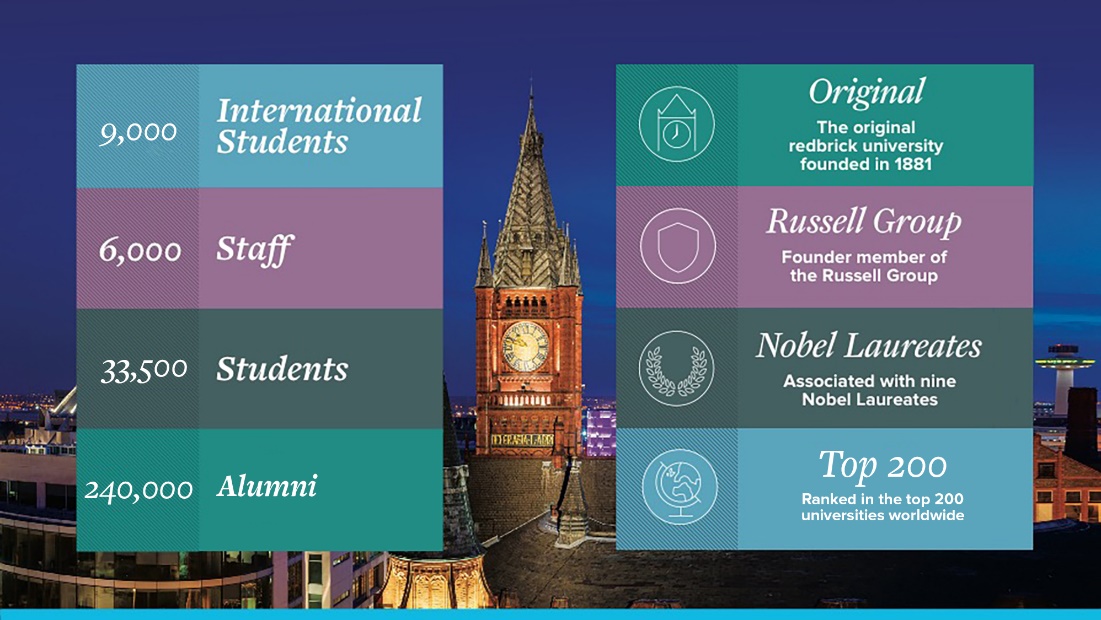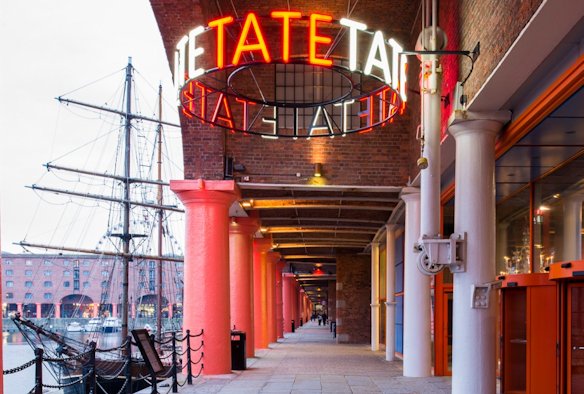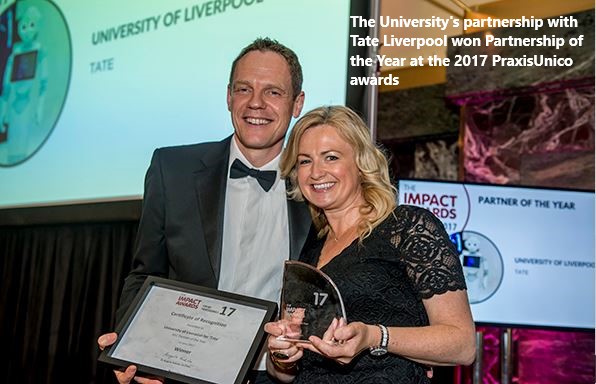Note You are currently viewing a previous version of this narrative statement as published in previous iterations of the KEF (KEF1 and KEF2). View the latest version
Institutional Context
Summary
Our University is a major player globally, with presence in China, Malawi and online; and also one rooted in the Liverpool City Region, reflected in the contribution to the economic and social fabric of the city and our commitment to Higher Education (HE) access for local students. Founded in 1881 with the mission statement “For Advancement of Learning and Ennoblement of Life”, these values focus our efforts today as we tackle the grand challenges of the age. Our areas of distinctive research strength include:
Advanced Materials, underpinned by our partnership with Unilever.
Infectious Diseases including our response to COVID-19 working with local NHS partners.
Heritage, developing capacity in the cultural heritage sector in Oman, Middle East and the UK.
Institutional context
We take a three-fold approach to knowledge exchange (KE) activity, enabled by strategic investment of HEIF, to foster opportunities for all colleagues to engage in KE:
1) To equip academics with skills to undertake KE through;
The flagship “Making an Impact” development series:, creating focus and profile for KE. Starting as one week of activity in 2018 (800 registrations across 28 sessions), this progressed in 2019 with an Industrial Strategy focus (1300 registrations across 58 sessions).
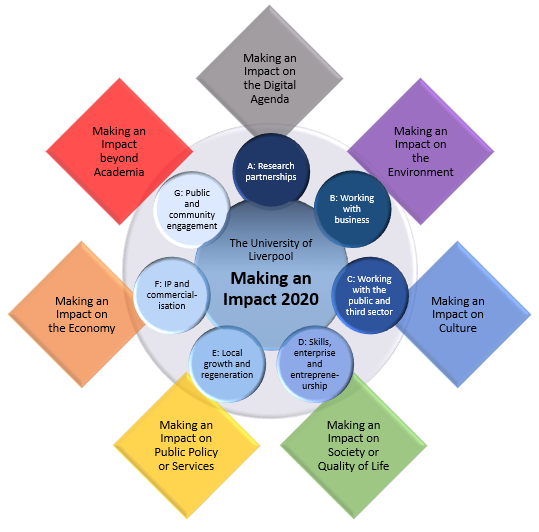
Investing in specialist teams, for example commercialisation and consultancy (Praxis-Auril 2019 Team of the Year).
2) To focus intensive activities on our distinctive research strengths, attracting clusters of talent, resources and partners. Exemplars include;
| Area of distinctiveness | KE exemplars |
|---|---|
| Advanced Materials | Physical asset: collaborations with Unilever since 1917, creating the £82m Materials Innovation Factory in 2018. This was catalysed by an unprecedented return to Unilever from the Centre for Materials Discovery (2006-2017) including two-fold increase in rate of invention from users and seven product innovations delivered to market. Commercialisation: |
| Infectious Diseases | Knowledge network: Centre of Excellence in Infectious Diseases Research (CEIDR), joint with Liverpool School Tropical Medicine: since 2017, has worked with over 180 businesses to support innovation in diagnostic, therapeutic and vaccine R&D.
|
| Heritage and Modern Slavery | Public and community engagement: Community-based approaches across 9 African countries through the Anti-Slavery Knowledge Network. Research exploitation: |
3) To catalyse KE through student enterprise, including;
Challenge: Multiple competitions with over 250 students, including a collaborative event with Unilever. In 2018/19, 50 students from widening participation backgrounds were supported to compete in a Netherlands enterprise challenge.
Develop: Nurturing students’ entrepreneurial skills and mindset through a three month programme ̶ Emerge.
Exchange: a growing enterprise internship programme with businesses and social enterprises.
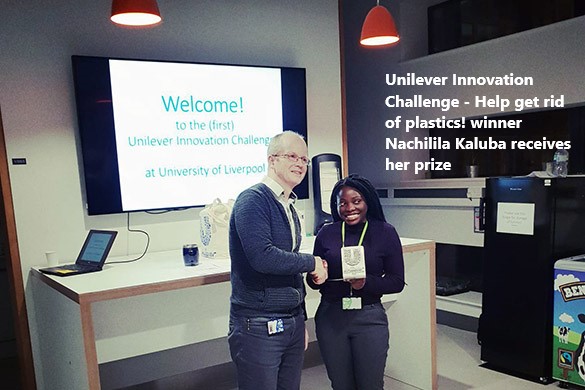
Place context:
We are a significant economic actor in LCR (one in 57 jobs is University-related), providing a platform for KE to shape LCR economic, cultural and environmental strategies. We also pursue KE across Northern England through the N8 Partnership. The Official Development Assistance research agenda further expanded our KE reach to LMICs.
All activities are supported by HEIF, leveraging other resources, for example GCRF and institutional funding.
For further information, please send queries to jkeyton@liverpool.ac.uk
Local Growth and Regeneration
Summary of approach
As an engaged civic University, our institution is pivotal in developing local and regional capital and has committed to a ‘Civic University Agreement’ in partnership with local government and other major institutions. We are also a key contributor to the city region’s Local Industrial Strategy and its post-COVID-19 economic recovery plans, supporting the city region’s levelling-up and ‘Building Back Better’ agenda.
In 2019, we published a report detailing the contribution the University makes to the city region, including an annual £652M GVA contribution to the Liverpool City Region. The below strategy, activity and case studies focus on the knowledge exchange aspects of this activity.
Aspect 1: Strategy
Locally, our greatest influence is in the Liverpool City Region (LCR) and supporting the levelling up agenda in the North of England through innovation, collaboration and skills and through the N8 Research Partnership.
LCR Combined Authority (LCRCA) states in their document on priorities for the local industrial strategy: “the City Region has developed a range of UK leading assets and capabilities, and has forged a unique, internationally renowned cultural vibrancy which singles it out as a place to do business, live, work and visit. However, there are also longstanding challenges, particularly in health, employment, skills, and transport connectivity, which act as a brake on our productivity and a barrier to developing a truly inclusive economy.”
Our University civic mission is to work with the city region to build strength and help address these challenges, many of which have been exacerbated by the COVID-19 crisis.
To address city and wider regional needs, we work directly with businesses, local government, policy makers, cultural organisations and charities. We are a key participant and stakeholder in the Knowledge Quarter (Liverpool’s Innovation district – chaired by our Vice Chancellor) the LCR Innovation Board (represented by our Pro Vice-Chancellor for Research and Innovation), and a range of sector specific LEP boards. We support the LCR through working in partnership with business, addressing regional health needs and influencing regional policy and practice.
Supporting local business growth and innovation
The purpose of our KE centres is to utilise our research, facilities and expertise to support the ambitions of a wide range of businesses and enterprises.
We have worked closely with the LEP to develop the Science and Innovation Audit, which examined key areas of strength for the region, based on research expertise and the potential for significant economic impact. The audit identified three focal themes: materials chemistry, high performance and cognitive computing and infection, all of which are also key University research strengths
We support local businesses through joint research projects, KTPs and providing consultancy and facilities services and we also create jobs and value directly through creating spin-outs and licensing our IP – for example through forming Polymer Mimetics, our joint venture with Scott Bader Company Ltd with a funding commitment of more than £1million.
Health
Poverty, including child poverty is a key issue in LCR, with poor health outcomes and inequalities persisting. The region has poor life expectancy for cancer patients, and three times the national incidence for head and neck tumours. Through our policy advice, research programmes and closing the gaps between clinical research, teaching and care, we work together with local NHS trusts to help address these health issues and inequalities. For childhood research specifically we work with Alder Hey to improve care and outcomes.
Policy, Heritage, Culture
We make significant contributions to spatial planning policy for the LCR and host the Heseltine Institute, bringing together academic expertise with policy-makers and practitioners. The Heseltine Institute has a particular focus on former industrial cities in the process of regeneration.
We support heritage-related local activities, for example supporting the city of Liverpool in retaining its UNESCO status, and working with Knowsley council to determine the archaeological significance of a market site.
We also have established partnerships with cultural organisations including National Museums Liverpool and our award winning partnership with Tate Liverpool .
Aspect 2: Activity
Specific activities underpinning our strategy include:
Supporting local business growth and innovation through KE centres and initiatives
Our KE centres engage with businesses daily and have delivered a range of impactful projects, harnessing significant internal and external investment and aligning with focal themes identified in the Science and Innovation Audit to create an innovation ecosystem, in the LCR:
The Materials Innovation Factory (MIF) is an £81M partnership between Unilever and the University accelerating materials discovery through collocation of industry and academia, and the use of robotics and high-performing computing. MIF also provides expert technical support and open access facilities for the use of start-ups and SMEs
The Virtual Engineering Centre (VEC) is the UK’s leading centre of virtual engineering technology integration for industrial and commercial applications (case study below).
The £15M Sensor City innovation centre is a joint venture between the University of Liverpool and Liverpool John Moores University, which supports application of innovative sensor technologies and is a key partner in the Liverpool 5 G Testbed looking at innovative ways to deliver health and social care.
CEIDR brings together the expertise of the Liverpool School of Tropical Medicine and the University of Liverpool, with a mission is to minimise the impact of infectious diseases and antimicrobial resistance on human health in Liverpool, the UK and globally.
We use a wide range of tools to interact with local companies including collaborative and contract research, licensing, consultancy and KTPs. Student enterprise activity is a growing area of focus for the University. We have run various, incubation programmes, challenges, competitions and hackathons engaging over 250 students including a collaborative event with Unilever. In addition, 37 students have taken part in enterprise internships with local businesses and social enterprises (link).
Health
We are a founding member of Liverpool Health Partners (LHP) – a limited company responsible for planning the services, research programmes and teaching activities carried out by the University and 7 local NHS Trusts. LHP was set up to enable an integrated approach allowing research to quickly progress from bench to bedside, bringing new developments into routine healthcare practice faster, in order to improve the health outcomes in Merseyside and Cheshire.
We have launched two new centres to help address the specific health needs of Liverpool. The Liverpool Head and Neck Centre draws together research and medical expertise to provide the best possible results for head and neck cancer patients locally. The Liverpool Centre for Cardiovascular Science brings together experts from our University with those from Liverpool John Moores University and LHP to work on the advancement of cardiovascular disease and stroke research.
We carry out service work with local NHS Trusts to help facilitate clinical trials (both commercially sponsored and non-commercial)- sharing our expertise and facilities for sample collection, storage, processing and analysis. For example, through a master service agreement with Clatterbridge Cancer Centre we have supported over 15 clinical trials through our Good Clinical Laboratory Practice labs and Experimental Cancer Medicine Centre in the last year alone. In addition, we also deliver CPD programmes for over 50 NHS Trusts locally and nationally.
The University’s response to COVID 19 demonstrates our close ties within the region. Together with LHP we:
Launched Liverpool STOP COVID, a city-wide initiative to help decrease the burden of COVID-19 locally, nationally and globally
Are delivering an integrated approach to supporting the city region's public health agenda.
Created a dashboard showing all activity across the region providing a summary of COVID cases and research studies (over 60 grants secured so far).
Lead (alongside Edinburgh and Imperial universities) the largest COVID-19 study (ISARIC), in Europe which identified obesity and gender as mortality risk factors and created an easy to use decision tool for COVID, helping stratify patients most at risk from COVID and influencing policy making decisions in government.
Jointly with Liverpool School of Tropical Medicine, received £18.6m of funding from UK Research and Innovation Strength in Places Fund to create eight specialist, research platforms for infectious diseases therapeutics in North West England, which will go on to transform the efficiency of new product discovery and development.
Obtained £2.2m in funding from Unitaid for AGILE, a project to rapidly identify drugs to help treat and prevent COVID-19.
Published a series of COVID-19 policy briefs created by the Heseltine Institute in collaboration with the LCRCA, which directly add value to the work of civic leaders and policy makers.
Created a hub to communicate our research and impact – through website, webinars, local radio, events
Policy, culture & heritage
The Heseltine Institute’s research has explored housing regeneration, the scale, scope and value of the city region social economy, graduate mobility, inclusive growth and the need for a local LCR Industrial Strategy, retail regeneration and the potential of the River Mersey to generate energy.
All the reports created can be accessed publicly and are frequently used by the LCRCA directly to help evidence and shape policy decisions.
Work from the Heseltine Institute and wider University helped shape the region’s Local Industrial Strategy, which is currently under review with BEIS and we have contributed directly to both the LCRCA and Liverpool City Council economic recovery plans.
Aspect 3: Results
A higher proportion of businesses engage in innovation and collaboration in the LCR than the UK average (LIS 2019) and the University acts as an anchor organisation to support this. In collaboration with other local and national stakeholders (Universities, Industry, LCR CA, LEP, Innovate UK, N8) we manage a pipeline of initiatives catalysing regional growth by attracting R&D investment, upskilling the workforce and safeguarding jobs.
Our KE centres, detailed above, interact with large local employers (for example IBM and Unilever) but we also support SMEs. The VEC led ERDF initiative - LCR4.0, supported the industrial digitalisation of SMEs within the city. The project received £4.4M of ESIF funding, matched by contributions from the delivery partners and supported over 300 enterprises and 40 new businesses, likely to result in a £31m GVA and 955 jobs over the next three years (Hatch Regeneris - 2019). The project featured in the Top 100 European Digital Champions list (Financial Times -2018) and has secured a £2M follow up project LCR4 START. We have created a video to communicate the tremendous positive impact that this project has had.
The ERDF Low Carbon Eco-Innovatory is an award-winning centre for low-carbon innovation across SMEs in Liverpool City Region and the Northwest - providing SMEs with direct access to research expertise and facilities. This body of industry-focussed research collaborations, including projects on coastal protection, renewable energy, life-cycle analysis and sustainable food, has contributed significantly to achieving clean growth by generating 120 new eco-innovative products and services, and in doing so creating 260 jobs and saving 10,081 tonnes of greenhouse gases.
We also host the Growth Catalyst programme, completed by 150 local business since 2012, which is designed to help support SME leadership to implement a long term growth strategy. The programme has been highly effective, and average growth of SMEs participating has been 26%.
Since 2017, we have supported 21 local KTP projects, including our KTP with Csols – where we worked together to build entities called nDrites, which act as software wrappers for lab equipment. CSols has sold more than £500,000 of nDrites and nDrite enabled LabApps as a result of the KTP, forecasting a further £2,255,000 in the next three years.
We have also positively shaped local health and spatial policy. Research by our Health Inequalities group demonstrating the health consequences of alternative public investment strategies has directly influenced national policies with major local impacts. Our work ensured an NHS resource allocation policy tied to socioeconomic deprivation - equivalent to an additional £1 billion going to more disadvantaged areas, and a reversal of the Government’s proposal to stop monitoring income related child poverty. In addition, this research resulted in widespread local actions to prioritise investment in children including preventing the closure of 10 children’s centres in Liverpool. Our Planning research has reformed professional planning practice developing the capacity of deprived communities across NW England to create their own neighbourhood plans and shaping an LCR strategy for 1.6 Million people for the next 15 years.
We recognise that Liverpool and the North still has a long way to go in order to truly ‘level up’, and we continue to shape projects and initiatives to ensure we build back a more innovative, inclusive and greener economy. We are launching the Children Growing Up in Liverpool study, focussed on improving the health and wellbeing of children and their families in the LCR. Jointly with other universities in the North of England we have also submitted an N8 Net Zero North proposal which connects the Northern Powerhouse’s science and research capabilities, skills providers and businesses to forge a green recovery from Covid-19.
For further information, please send queries to Sonja.vujovic@liv.ac.uk
Public & Community Engagement
Summary of approach
Public and community engagement is at the heart of our activities, reflecting our desire to address societal challenges and maximise the benefit of our research. We engage with a vast range of communities, including:
Place-based, for example as part of our civic mission to support the local region or through our interactions with communities in low- to middle-income countries
With patient communities to inform the design, conduct and delivery of our health-related research
With communities of interest such as young people or culture and the arts.
Public and community engagement is championed at all levels, supported by a strong infrastructure including our flagship Making an Impact skills development programme.
Aspect 1: Strategy
Our Public Engagement Strategy, developed through consultation and supported by RCUK funding, delivers a strategic and coordinated approach to public and community engagement (PCE). We have worked towards a number of key objectives, nurturing relationships with key communities and stakeholders to maximise societal benefit from our research; and establishing comprehensive training and development opportunities to upskill staff and students toward becoming a truly engaged University.
A key focus has been our commitment to improving the health, education and employment outcomes of the people of the Liverpool City Region. In 2019, the University committed to producing a Civic University Agreement, working with local institutions, businesses, community organisations and authorities to understand opportunities and challenges for the local population and collaboratively agree priorities and resources to address them. This work builds upon our long-established track record of civic engagement. We have increased and enhanced local engagement with the University through our collections, events and estate, a key objective of our Heritage and Culture Strategy, attracting and engaging with new audiences and stakeholder groups, including community groups and schools.
The emergence of the Official Development Assistance research agenda in 2016 provided the University with the opportunity to engage at scale with the public and communities in low- and middle-income countries. Our Global Challenges Research Strategy is overseen by a Global Challenges Strategy Group and underpinned by QR GCRF funding. This ensures an integrated approach to research, impact and PCE for the most vulnerable communities. Examples of projects with a specific PCE focus include: developing community-led strategies to combat modern slavery in West and Central Africa; and working with Yazidi youth in Iraq to preserve their heritage and identity.
PCE is championed from the highest levels within the University; each member of our Senior Leadership Team has an engagement remit, whether public engagement with research, cultural or civic engagement etc. Significant investment has developed PCE skills, with a coordinated network of Impact Champions who encourage and support colleagues in gaining engagement experience, and a flagship skills development programme, Making an Impact, for staff, students, partners and members of the public. Alongside our internal investments, we have attracted a range of funding to support our PCE activity, including significant investment from the Wellcome Trust to enhance the scale and range of opportunities offered.
Building on this foundation, we transformed our approach to PCE adapting to COVID-19. We have galvanised our community of staff, students, alumni and partners into delivering a collective response to meet the challenge of coronavirus. We have engaged with, connected and supported local communities, whilst also furthering our reach on a national and international scale, pivoting to tackle issues associated with the pandemic supported by a comprehensive engagement strategy.
Aspect 2: Support
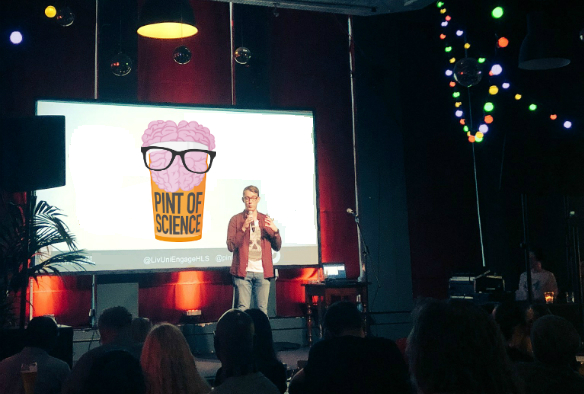
As part of our strategy to reward and recognise PCE activity, we have invested in systems and communication to enable academics to record impact and engagement in real time, providing greater visibility and integration with planning and recognition processes. We have broadened academic leave policy to encompass impact and engagement activity. An annual PCE grants scheme, supported through HEIF, offers £100k across approximately 12 projects to support activities to engage the public with our research. Targeted support and investment has advanced specific priority areas, such as pump-priming relationships with partners in low- to middle-income countries as the basis for larger-scale projects (e.g. Anti-Slavery Knowledge Network) as part of the programme of GCRF activity.

Networks of public engagement, impact and science communication support roles are coordinated to build up a community of specialists, sharing best practice and informing institutional activities and initiatives. Our activity is supported and crucially informed by our strong relationships with partners and community groups. Examples include a Young People’s Advisory Group established in 2018 to review research proposals across the University that will impact children, and well-established Public & Patient Involvement Panels found in many of our institutes (including testimonials), building on extensive experience in our health research.
2021 will be the 10th year of the Outstanding Contribution to Public/Civic Engagement category in the University’s annual Staff Awards, recognising teams and individuals who have made an outstanding contribution to societal benefit through PCE, and celebrating the realisation of the civic purpose of the University. The awards enable us to effectively communicate a broad range of PCE success stories to a wider audience.
The University’s social media strategy plays a crucial role in our PCE achievements. With our targeted approach and range of connected content and activities, we have built up a community with which we regularly engage, its effectiveness allowing us to quickly meet the appetite for engagement and online events during the COVID-19 pandemic. We also draw on our N8 Research Partnership to run combined social media campaigns.
Aspect 3: Activity
We host a wide range of events to engage the public with our research and debate issues of topical concern, and to facilitate networking and relationship building. Our HE-BCI return demonstrates our reach, with over 4.2 million attendees of our public events during the assessment period. As part of our strategy to open up our campus to the public, in 2017 we launched an annual Open House Festival providing a popular programme of free public events, held across campus.
Our Global Challenges Research activity delivers significant benefits for communities in low- to middle-income countries. This has included partnering with the Ministry of Health in Kenya to develop national training of community health workforce in household air pollution, prevention and health; training displaced Yazidi youths from refugee camps in north Iraq so they could produce documentaries to preserve heritage and memories; and giving voice to victims of conflict in Colombia. Pump-priming has been used to pilot engagement with diverse communities. For example, PhotoVoice was used to amplify the voices of excluded Maya youth and women in remote communities in Belize and to bridge the gap between Maya Elders and youth. Engagement activities in Salvador identified a range of techniques and ideas to better embed projects locally which involve favela residents in mapping communicable and non-communicable diseases, as well as exposure to violence.
We continue to make significant strides in arts and culture, partnering with new organisations to bring our research and insight to whole new audiences. Building on our partnership with Tate, in 2019 the University signed a three-year agreement with National Museums Liverpool giving rise to a range of public engagement initiatives. Our hugely successful Meet the Scientists programme is delivered at the World Museum, and engages children, families and the general public with our health and life sciences research through innovative hands-on activities and experiments designed and delivered by our researchers and students at both undergraduate and postgraduate levels.
During the coronavirus crisis, we kept local communities connected and engaged in art and culture by creating an online hub of activities for all ages and interests called ‘Culture at Home’, with a focus on inclusivity and ease of access for all. Uniquely this initiative embeds the latest research, thinking and technology into a virtual environment, maintaining the richness of the city’s cultural life during a period of uncertainty and restriction. In its first three months, the hub received over 6,000 page views, and most visitors arrived via organic searches, reflecting the appetite for such content during lockdown. A series of ambitious fortnightly online events, Liverpool Responds has provided insight into a range of COVID-related research activity and attracted large audiences covering the UK, Asia, US and Africa, which would not be possible in person. Our live Scouse Science video podcast series, led by one of our PCE champions, has engaged the public with scientific progress being made to tackle the virus and the wider impact of the pandemic.


Aspect 4: Results and learning
We have invested significant time and resource to build a culture of evaluation for PCE and impact activities, as a core part of project planning. All internal pump-priming awards are conditional on a full evaluation report at the end of the project. Initial objectives are tracked and monitored to ensure individual, scheme and institutional level reflection and learning. To support our academic community in evaluating their own PCE and impact activities, evaluation-focussed training, tools and resources have been developed and delivered across the institution.
Evaluation has been built into each of our major programmes of activity. We monitor the outcome and impact of our activities in different ways. At a simple level, we track attendance figures for our major events to monitor trends, with a marked increase in levels of engagement in the last two academic years, averaging 2,000,000 attendees a year compared to an average of less than 600,000 in the preceding three years, as detailed in our HE-BCI returns. Feedback from attendees informs future planning alongside appeal and reach measured through social media analytics. Our internal systems track academic PCE activity at an individual level, with almost 2.5 times as many events recorded on average in 2018/19 and 2019/20 when compared with the previous three years.
One of our Key Performance Indicators monitors the levels and quality of our research impact. The voice of users, stakeholders, communities and the public is viewed as key to this process to ensure our activities are as meaningful as possible, with best practice routinely shared to inform future activities. As well as supporting future planning, this exercise builds expertise in evaluation of impact and engagement activities, identifies content to showcase as part of broader communication and recognition processes, and supports our institutional Research Excellence Framework preparations.
Aspect 5: Acting on results
We regularly review our PCE strategy, seeking input from a range of staff and stakeholders, and using the NCCPE’s self-assessment EDGE tool to track our progress. A mostly “Developing” institution in 2015, we now identify as either ‘Gripping’ or ‘Embedded’ across the different areas of focus, and have plans in place to continue this progress.
Evaluation of our flagship Making an Impact programme has been crucial in informing our future approach to staff development and support. The Kirkpatrick model of evaluation (Kirkpatrick, 2009) is applied each year, and detailed evaluation reports have been shared widely internally and with our partners and are also publically available on our website. Each year, we receive feedback from several hundred attendees at various post-event intervals. The 2019 evaluation report highlighted an overwhelmingly positive response from attendees and 90% confirmed the sessions supported their future needs and career plans. The qualitative feedback reported how the series enabled participants to develop their understanding of the importance of involvement of users at all stages of research and to establish user stakeholder and participatory groups, map out the key stakeholder matrices and highlight research messages that resonate with the diverse groups. Reflections on Making an Impact 2020 have already fed into planning for next year, with a particular focus on engaging with facilitators from more diverse backgrounds, reaching out further to more diverse participants and ensuring that BAME representation is reflected in programme content.
The Global Challenges Strategy Group conducts year-on-year analysis to inform future support or prioritisation of countries or subject disciplines. Each pump-priming project is tracked to identify impact beyond the year in which it was funded. Lessons learnt from larger externally-funded projects are fed back into research and engagement development work. For example, the Antislavery Knowledge Network was commissioned by UK funders to develop safeguarding guidance for the UK sector. This is informing the University’s policies and process for working with vulnerable individuals and communities.
For further information, please send queries to jkeyton@liverpool.ac.uk
